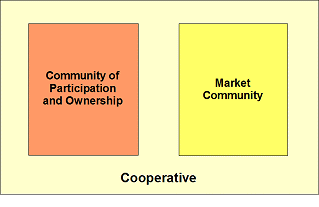A Regional Economic Community as a Cooperative

Business Divisions of the Cooperative
The ReeComm is founded as a registered cooperative. The CPO and the Market Community are run as two separate business divisions of the one co-op. To have both under the same legal and commercial roof is expedient, since the market community may sell Groks and pass the proceeds to the CPO for investment, or accept activity points earned by working for the CPO as payment for selected services, or even convert them to Groks as final remuneration. Both are also linked via the regulations concerning the surplus of the CPO.
In the following sections, the structure of the CPO and the market community (as they have been described in the previous chapters) are projected onto the structure of a single cooperative.
Note: This description currently follows German law regarding Cooperatives, and thus will almost certainly not be 1-to-1 applicable to the UK situation. But a description of the UK laws and possibilities would in turn not be applicable to the USA for example, and so on. We will be glad to receive and incorporate suggestions specific to your local laws and customs!
Bodies of the Cooperative
The bodies of the Cooperative are, where applicable, those of the CPO (the CPO's Meeting of Entrepreneurs has no matching body in the Cooperative).
The General Meeting of the Cooperative consists of those persons who have joint-ownership certificates of the CPO with the entitlement to vote. The Council of Representatives of the CPO takes on the role of the Supervisory Board. The Executive of the CPO is the Board of Directors of the Cooperative.
Business Division CPO
The business division CPO looks after the companies in which the Cooperative has participated fully or partly. It organises the Meeting of Entrepreneurs and manages the register of joint-ownership certificates as well as the holding account.
Certificates of the CPO without the entitlement to vote are issued by the Cooperative as certificates of participation in future yield.
Members of the CPO will generally also be members of the market community, although this is not mandatory. It should however be noted that members of the CPO can only take part in the distribution of Grok surplus if they maintain a market account with the market community.
Business Division Market Community
The business division Market Community cannot be completely independent of the business division CPO, if the bodies of the cooperative are those of the CPO, as suggested above. The co-op must by law care for the economic welfare for its members, thus it must have a "final say" or veto rights to ensure that it will not be compromised by economic decisions of the market community, whose members need not be co-op members.
The General Meeting of the market community is not identical with the General Meeting of the Cooperative. Every member of the market community has one vote in the market community General Meeting.
The business division is run by the
Council of Control and Decision
elected by the market community General Meeting. Major decisions affecting
the financial status of the co-op should be met in unified General Meetings
of members of both the co-op and the market community; minor ones should be
ratified by the Board of Directors of the Cooperative.
The administration is performed by the organisation team. The events
group is responsible for the organisation of events.
In order to participate in the market community it is not necessary to be a member of the Cooperative. The credit facility of the market account can be safeguarded by the deposition of certificates of participation in future yield (= joint-ownership certificates without the entitlement to vote), for which membership of the Cooperative is not required.